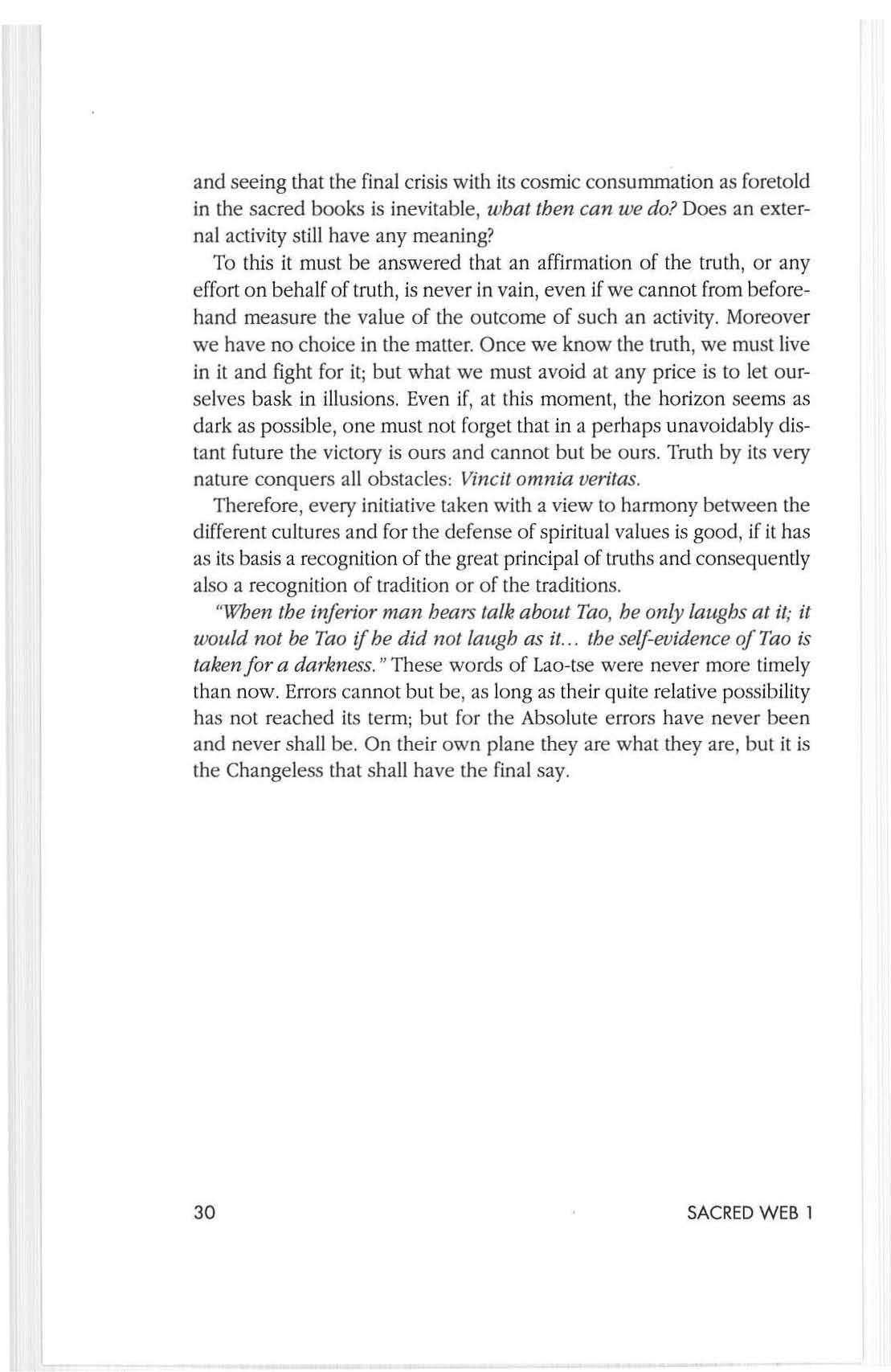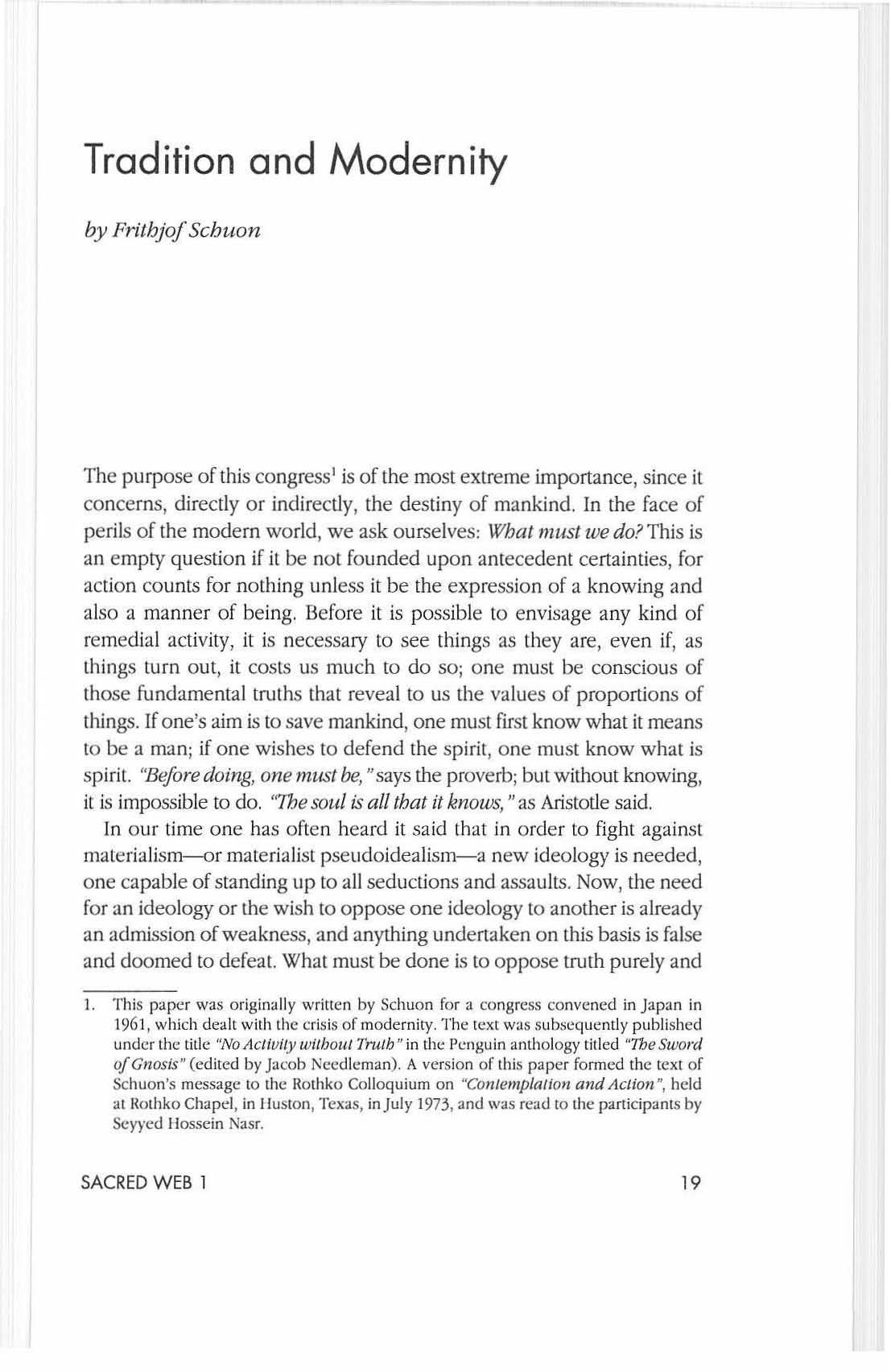
28 minute read
Tradition and Modernity
from Sacred Web 1
by Frilhjoj Schuon
The purpose of this congress l is of the most extreme importance, since it conce rn s, direc tly o r indi rectly , the des tiny o f mankind. In th e fac e of perils of the mod em wo rld, we ask ourselves: Wbalmust we d o? This is an empty quest io n if it be not founded upon antecedent ce rtainties , for ac tion co unts for not h ing unle ss it be the ex press io n of a knowing and also a manner of being. Before it is possibl e to e nvisage any kind of remedia l activity , it is ne cessary to see thing s as they are , even if, as th ings turn ou t, it costs us much to do so; o n e must be conscious o f those fundamen ta l t ru th s th at revea l to us the va lues o f proportions of things. If one 's aim is to save mankind , one mu st first know w hat it means to be a man ; if one wishes to defend the s pirit, o ne must kn ow what is s pirit. "Before doing , one must be, " says the proverb; but without kn owi ng , it is imposs ibl e to d o. "The soul is all that it knows, "as Aris totle said.
Advertisement
In o ur lime one h as ofte n h ea rd it sa id that in order to fight against male ri a li srn--o r mat e riali s t pseudoide ali sm-a n ew id eo logy is ne e ded , one capable of stand in g up to a ll seductions and assaults. Now, the need for an ideo logy or t he wish to oppose one ideo logy to anothe r is already an adm iss ion of weakness, and a nything und e rt ake n on this basis is false a n d doomed to defeat. What mus t be done is to oppose truth purely and
I. This paper was originally wri{{en by SeilUon for a co ngr ess conve ned in Japan in 1961, which dealt with the crisis of modernity. The text was subseque ntly published under the title "No A ct l vlly wllbolll in the l'l:nguin antbology titled "!beSwo ,.d O/G l IOsis" (edited by Ja cob Ncedh!m an ). A version of Ihis paper formed th e text of Sc h uon 's message to th e Hothk o Co ll oqu ium on and Actioll H, held a t Ru thko Ch apd , in Ilus lon, Texas, in July 1973, and wa s read to th e parti c ip,lIl lS by Scyyed Il osscin Nasr
SACRED WEB 1 simp ly to the false ideologies , that same tnlth that has always been and that we cou ld never invent for the reason that it exists outside us and above us, The wo rld is obsessed w ith "dynamism" as if this consti tuted a "categorical imperative" and a uni ve rsa l remedy and as if dyn amism had any meaning or positive efficacy outside truth.
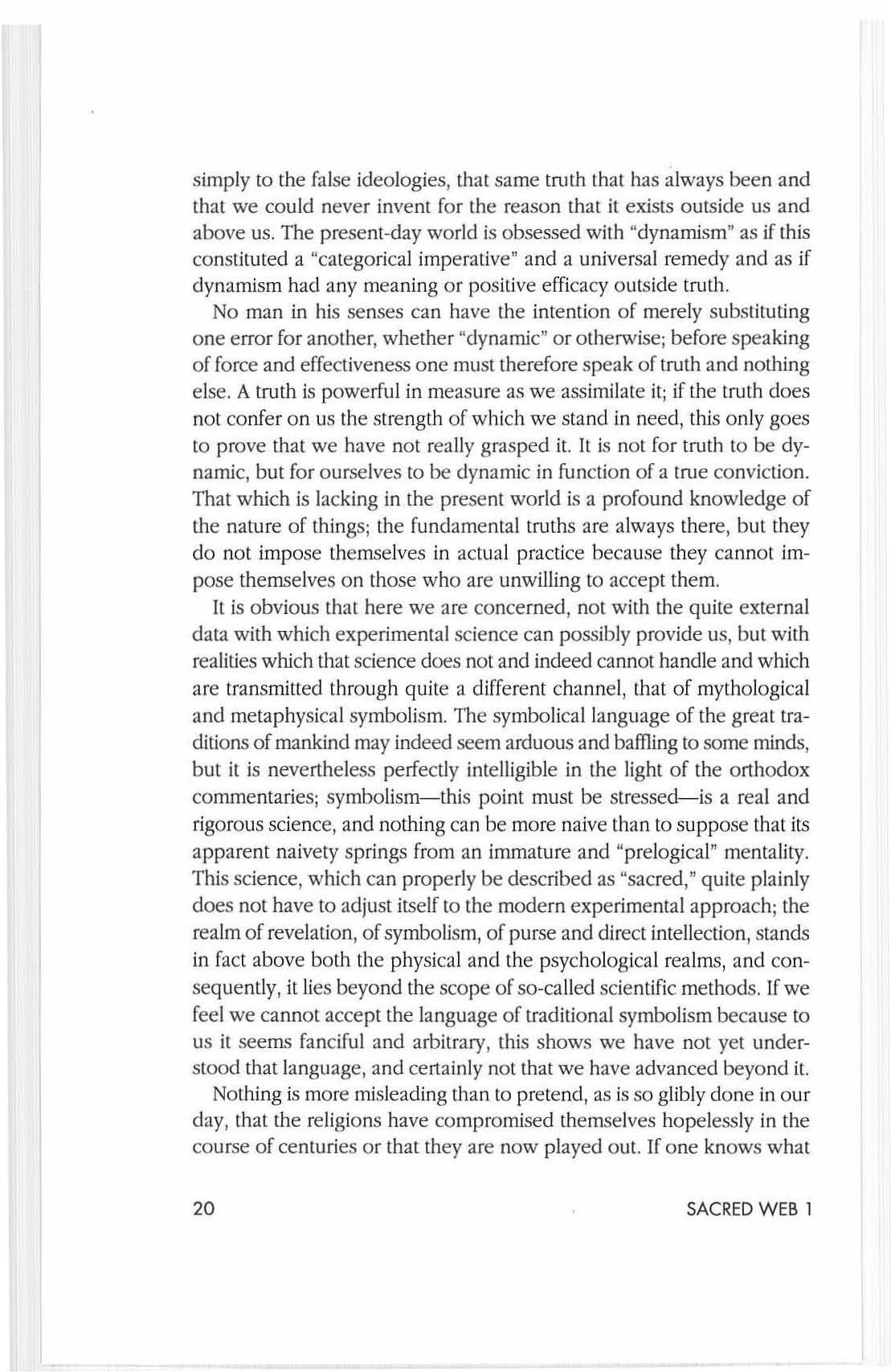
No man in his senses can have th e intention of merely subs tituting one error for another, whethe r "dynamic " or otherw ise; before speaking of force and effec ti veness one must th erefore speak of truth and nothing else. A truth is powerful in measure as we assimilate it; if the truth does n ot confe r on us the strength of which we stand in need, this only goes to prove that we have not re ally grasped it. It is not for truth to be dynamic, but for ourselves to be dynamic in function of a true co n victio n . That whic h is lac kin g in the prese nt world is a profound knowledge of the nature of things; the fundamenta l truths are always there, but they d o not impose themselves in actual prac tice because th ey cannot impose themselves on those who are unwilling to accept them.
It is obvious that here we are concerned, not wi th the quile ex ternal data with which experimental s c ience ca n possibly provide u s , but with realities which that science does not and indeed cannot handle and which are transmitted through quite a different channe l , that of myth o logical and metaphysical symbol ism. The symbo lica l language of th e great traditions of mankind may indeed seem arduous and baffiing to some minds, but it is nevertheless perfectly intelligib le in th e li ght of th e orthodox commentaries; symbolism-thi s point must be stresse d-i s a rea l and rigorous science, and nothing can be more naiv e th an to suppose that its apparent naivety springs from an immature and "pre logical " mentality. This science , whi c h can properly be described as "sac red ," quite plainly does not have to adjust itself to the modern experimental approach; the realm of revelation, of symbolism, of purse and direct intell ec tion , stands in fact above both t he physical and th e psychol og ica l realm s, a nd consequently, it lies beyond the scope of so-called scient ifi c methods. If we feel we cannot accept the language of t raditi ona l symbolism because to us it seem') fanciful and arbitrary . this s ho ws we have not yet understood that language, and certainly not that we have adva nc ed beyond it.
Not hing is more mis lead in g than to pretend, as is so glibly done in our day , th at th e re ligi ons have compromised themse lves hopel ess ly in the course of centuries or that they are now pla yed out. If one knows what a religion really consis ts of, one also knows that the religio ns cannot compromise themselves and that they are ind ependent of human doings; in fa c t , nothing men do is able to affect th e lraditi on<l l doctrines , symbols, or rit es. The fact that a man may exploit religion in orde r to bolster up nationa l or private interests in no wise affects religion as such. In Japan, Shinto , for examp le , was latterly made to serve political ends, but it was in no wise compromised in its e lf by thi s fact , nor co uld it be. Its symbols, rites, traditions, moral code, and doctrine remain what they always were, from th e "Divine Epoch" down to our ow n times; and as for an ex hau sti ng of th e religions, one might speak of thi s if all men by now be co me saints or Buddhas. In that case only co uld it b e adm itted that th e re ligi ons were ex h a usted , at least as regards th eir forms.
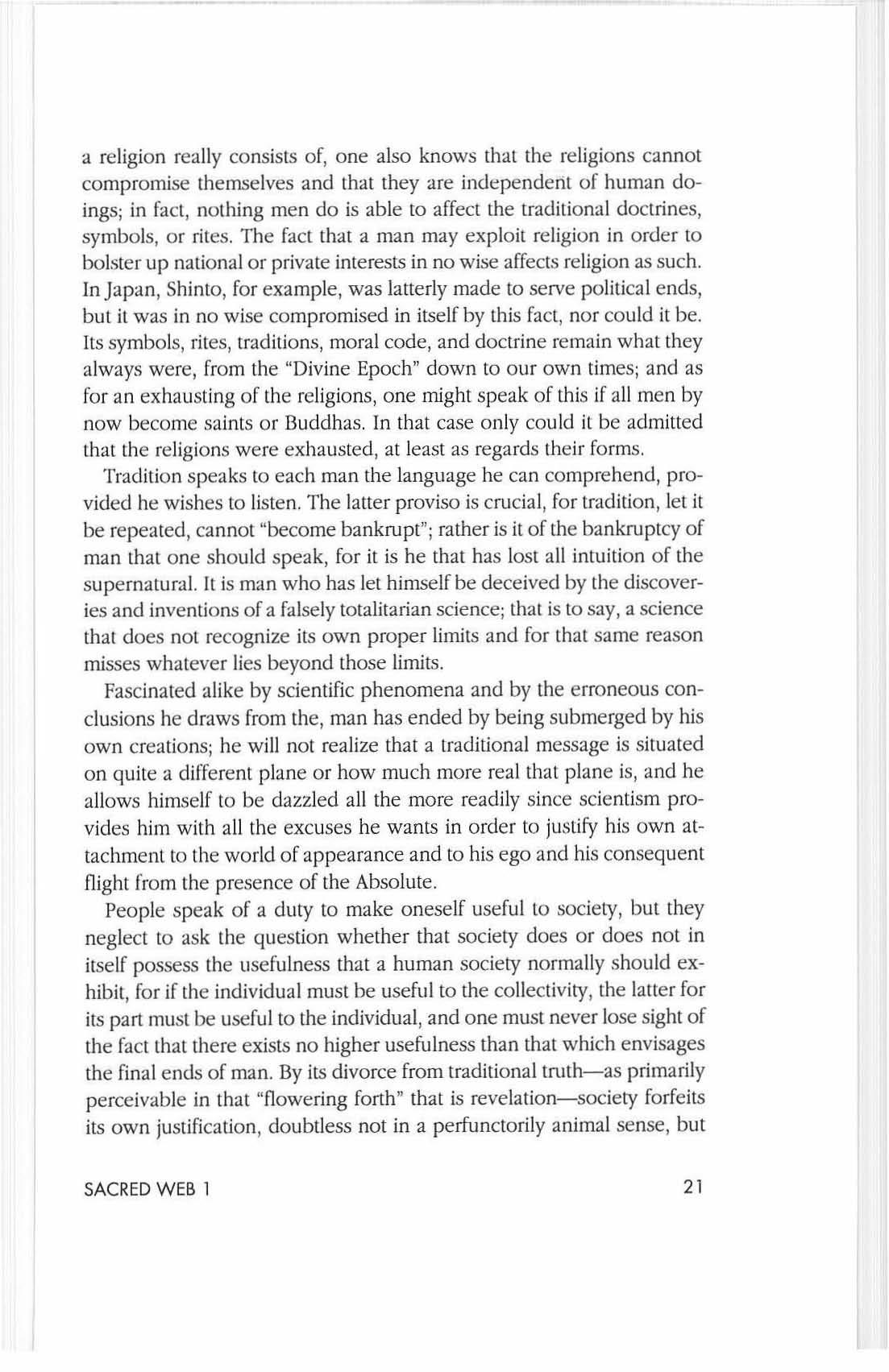
Tradition s p eaks to each man the language he can comp re hend, provided he wishes to li ste n The latter pro viso is crucial, for tradition , let it be re peated, ca nn o t "become bankrupt"; rather is it of th e bankruptcy of man th at one shou ld speak, for it is he that has lost all intuiti on of th e s up e rn at ur al. It is man who ha s let himself be deceived by th e dis cove ries and inven ti ons of a falsely tota lit arian science; that is to say, a science th at d oes not recogn ize its own proper limits and for tha t same reason misses w hat ever lies beyond those limits.
Fascinated alike by scie ntifi c phen omena and by th e erroneous conclu s ions h e draw s from th e, man has ended by being submerged by hi s own c rea tion s; h e will not realize that a traditional message is s ituat ed on quite a different plane or how much more real that p lane is, and h e allows himself to be dazzled all the more readily since sc ienti sm provides him w ith all th e exc us es he wants in order to ju s tify hi s own atta c hm e ntt o th e world of appea rance and to hi s ego an d his conseq u e nt flight from th e presence of the Absolute.
People spea k of a duty to make oneself usefu l to SOCiety, but they neglect to ask th e question whether that society does or does not in itse lf possess the usefulness that a human soc iety normall y shou ld exhibit , for if th e individual must be usef ul to th e collec tivity , the latter for its pan mu st be usefullO the individual , and one must never lose sigh t of th e fa c llh at th ere ex is ts no higher u sefu lness than that wh ic h e nvisages the final ends of man. By its divorce from traditional truth-as primarily perceivable in that "flowering fonh " that is revelation-society forfeits its own ju stification, doubtless not in a perfun c tor il y an imal sense, but in the human se nse. This human quality impli es t hat the collectivity . as suc h , ca nnot be t he ai m and purp ose of the individua l but th at, on th e cont rary, it is t he indi vid ual who , in his "solitary sta nd " before th e Absolute and in the exercise of hi s s upreme functi o n, is the aim of purpose of co llect ivity. Man , w h e ther he be co nce ived in th e plural o r th e s ingular, o r whet h er hi s func tion be direc t o r indirect , s ta nd s like "a fragment o f absoluteness" and is made fo r th e Abso lut e; he h as no other cho ice before him. In a ny case, o n e ca n de fin e the socia l in terms of truth , but o ne c annot define truth in terms of the soci al.
Refere n ce is o ft e n made to th e "se lfis hn ess" of those who busy th e mse lv es wi th sal vation, and it is s aid that in stead of s aving onesel f one oug ht to save ot hers; but this is a n absurd kind o f argume nt , s ince e ither it is impossibl e to save others, or e lse it is poss ib le to s a ve them but o nly in v irtue of our own sa lvati on o r o f our own e ffort towa rd sa lva t ion. No man has ever d one a se rvi ce to anyone else whatsoever by remain ing "a ltru is ti c all y" attac h ed to hi s own d efec ts. He who is capable of be ing a sa int bu t fail s to beco me such cert ainly will save no o ne e lse; it is s heer hypoc risy to conceal one 's ow n weakness and s p iritual luk ewarmness behind a screen o f goo d wo rks be li eved to be indi s p e nsabl e and of abso lute va lu e.
Another erro r, closely re lated to the o n e ju s t po in ted o ut , consis ts in s upposing that con te mplative spi ritua li ty is opposed to a ction o r renders a man incapab le of ac tin g , a bel ie f that is beli e d by a ll the sacred sc riptu res and especially by the Bhagavad-gita. InJapan the exa mpl e of sain ts s uc h as Shotoku Tais hi , Hojo To kimun e, Shinran Shan in , and Nich iren prov es-if proof is needed-that s piritu a lit y is neit he r oppo se d to action no r dep e nd e nt up o n it , and a lso that sp irituality le ads to t he mos t perfec t ac tion w h eneve r circ um s ta n ces require it , ju st as it c an al so, if ne cessa ry, turn away from th e urg e to action when no immediate aim im poses the nee d for it.
To c ut off man from th e Abso lute a nd reduce him to a co ll e c ti ve p henom e non is to d e pri ve him of a U rig h t to exis te nce qua man If man deserves t hat so man y efforts s ho u ld be spen t on hi s beha lf, th is c annot be s imply becau se he exists, ea ts, and s leeps o r because he likes w hat is pl easa nt a nd h ates what is unpl easant , fo r th e lowes t of the anima ls are in s imil ar c ase wilhout bei ng considered for thi s reaso n our e qu a ls and treate d ac cordingly. To th e objection that man is di stingu ish ed from t he animal by hi s intelligence , we will answer that it is precisely thi s intellec· tual superi ority that the social egalitarianism of the mod ern s fails to tak e into account, so mu ch so that an argument that is not appli ed consist· ently to men cannot then be turned against the animals. To th e objection that man is distinguished from animals by his we will answer that th e complete ly profane and worldly "c ulture " in qu es tion is nothing more than a specifically dated pastime of the human anima l; that is to say , thi s culture can be anything you plea se, while wa iting for th e human animal to s uppress it altoge t her. The capacity for absoluteness that characterizes human inte ll ige nce is th e only thi ng conferring on man a right of primacy; it is only this capacity that gives hi m the right 1O harness a horse to a ca rt. Tradition, by its above -worldly chara cter, manife sts the rea l super iority of man; tradition alone is a "human ism" in th e positive se nse of the word. Antitraditional culture, by th e very fact that it is without th e se nse of the Ab solute and even the se nse of truth-for these two things hang together---cou ld never confer on man that unconditional value and those indisputable right s that mod ern humanitarian ism attributes to him a priori and without any logical justification.
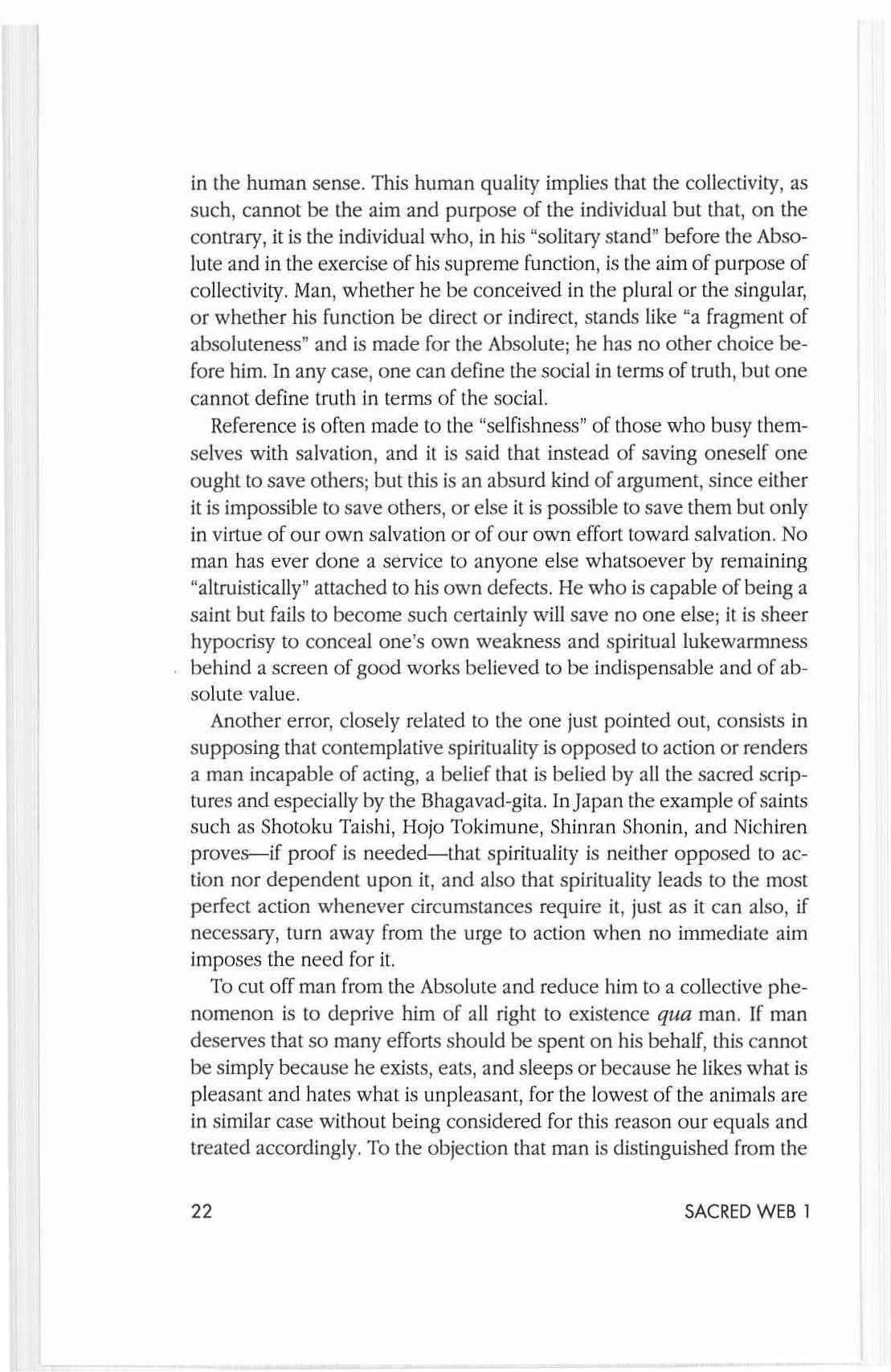
The sa me co u ld a lso be expressed in another way: When p eo ple s p ea k of "c uiture," th ey generally think of a host of contingencies, of a thousand ways of use less ly agitating the mind and disp ers ing o ne's attention , but th ey d o no t think of that prinCipl e that a lone co nfe rs lawfuln ess on human work s; this principle is the transcendent tmth, whence springs all genuine culture. It is impossible to defend a culture effectively-such as t he tradit ional cu lt ure of Japan , which is one of t he mo st precious in the world-without referring it back to its spiritual princip le and without seeking ther e in the sap th at keeps li fe going. Agr ee ment as b etwee n cultures mean s agreement on sp iritual principles; for truth , despite great differences of expression, remains one.
Many p eo pl e of our time reason along the foll ow ing lin es: The religions--or the differing spir itua l perspectives within a given religi oncontrJ.dict one ano ther, therefo re they cannot aU be right ; co nsequently none is tru e. Thi s is exactly as if one said: Every indivi dual claims to be " I," thus th ey ca nnot all be right ; consequently non e is " I. " Thi s examp le show s up th e absurdity o f the antireligiou s argument, by re ca lling th e real analogy betw ee n the inevitable external limitation o f reli giou s languag e an the no less inevitable limita tion of the human ego. To reac h this conclusion, as do the rationalists who use the above argument, amounts in practice to denying th e diversity of the knowing subjects as also the div e rs ity of aspects in the objec t to be known . It amounts to pretending that there are neither pOints of view nor aspects; th a t is to s ay , that there is but a s ingle man to see a mountain and th at th e mountain has but a si ngle side to be see n. The error of the subjectivist and relativist philosophers is a contrary o n e. According to them, th e mo untain would alter its nature according to whoever viewed it; at one time it might be a tr ee and at another a stream. Only traditional me taph ysics does justice both to the rigour of o bjectivity an d to th e rights of subjectivity ; it alone is able to explain the unanimity of the sacred doctrines as well as the meaning of th e ir formal divergencies.
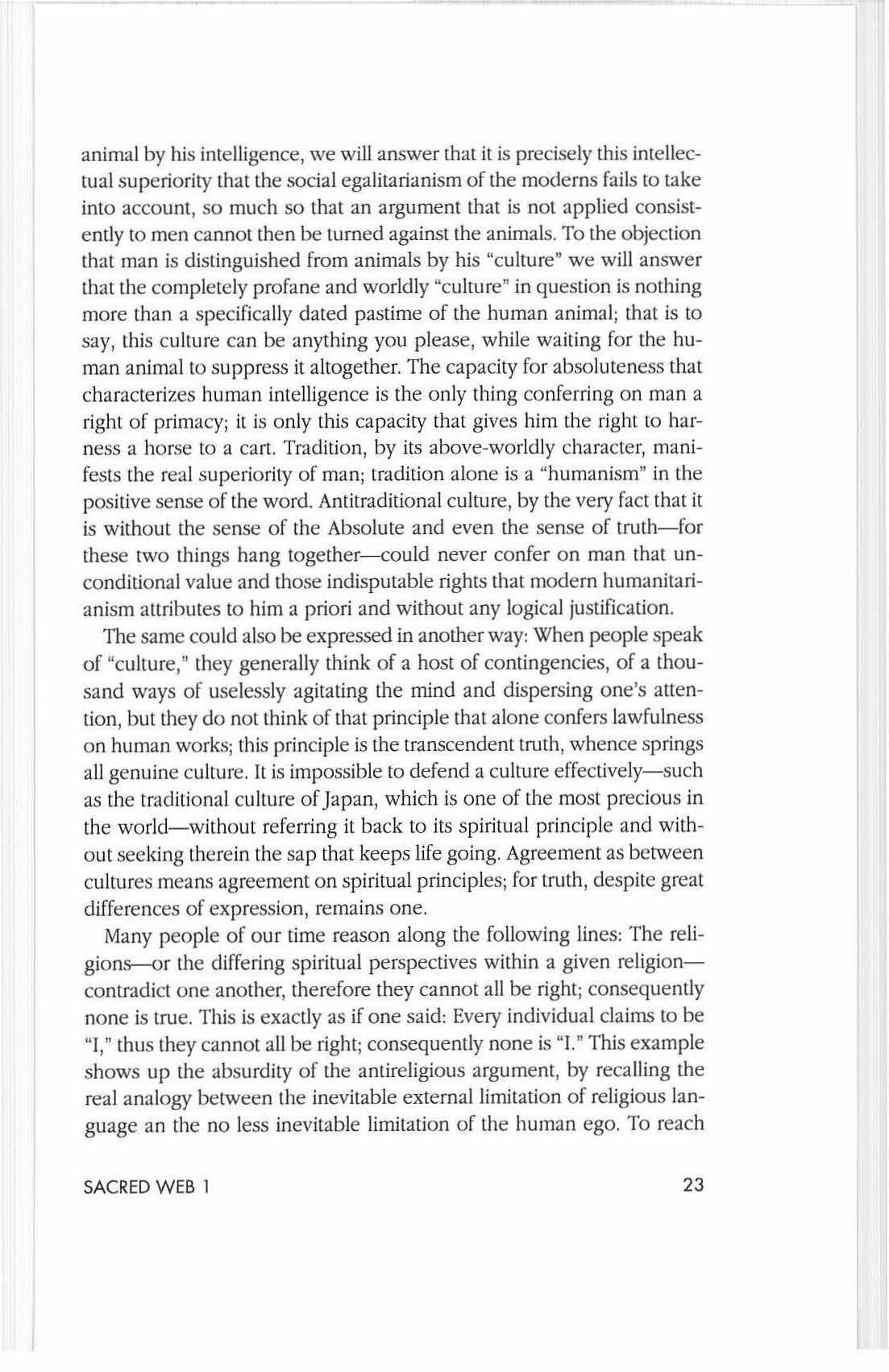
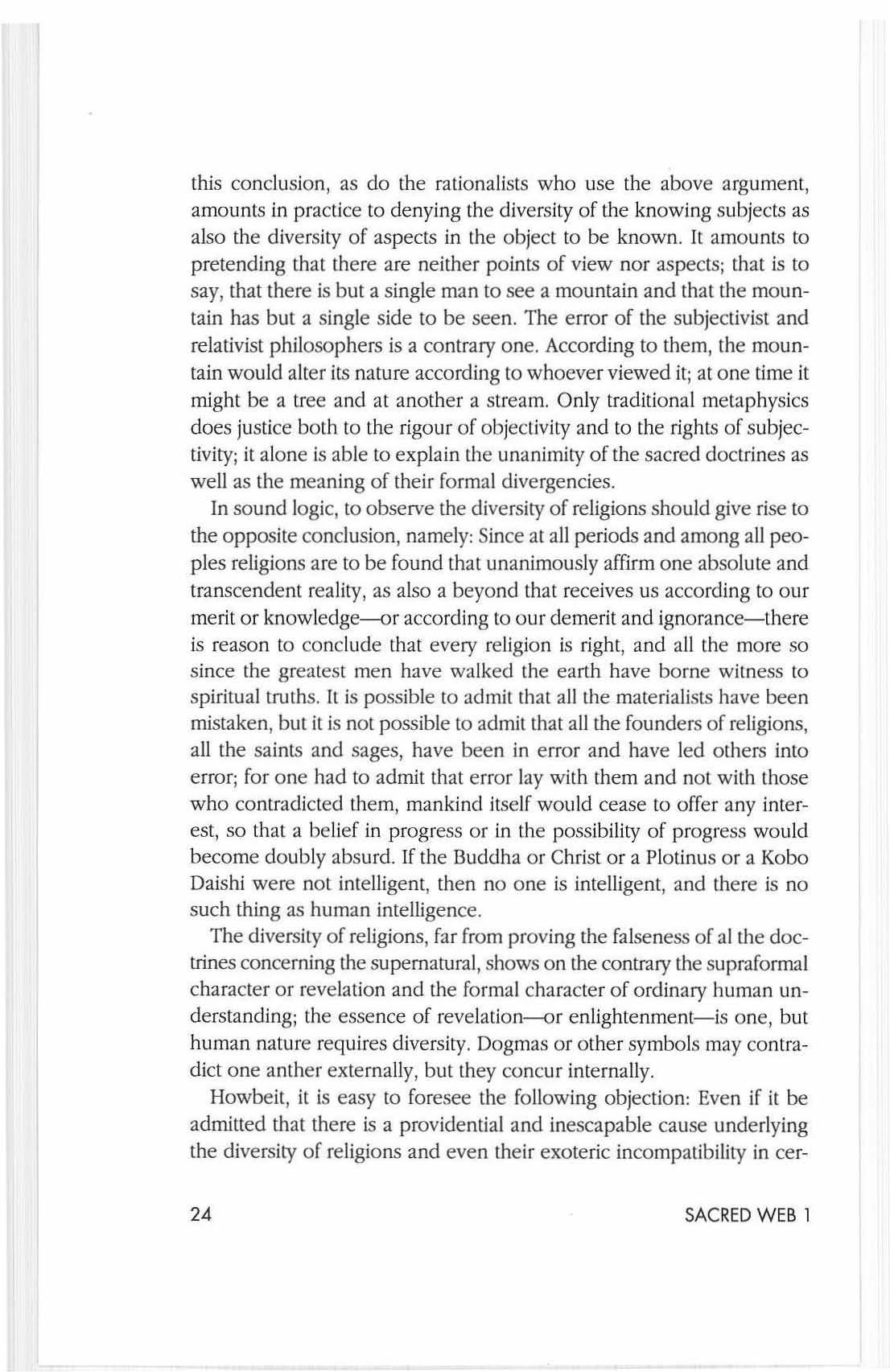
In so und logic, to o bserve the diversity of re ligions s hould give rise to the opposite co nclu s ion , nam e ly: Si nce at all periods and among all p eoples religion s are to b e found that unanimously affirm one absolu te and transcendent reality, as also a b eyo nd that receives u s a cco rding to our merit or kn ow le dg e-or according to our demerit and ignorance-t here is reason to co nclud e that every re ligio n is right , and all th e more so s ince the g rea test me n ha ve walked the ea rth have bo rn e witness to s piritual tnahs. Il is possible to admit that a ll the mat eriali sts ha ve been mistake n , but it is not poss ible to admit th a t all the fo und ers of re li g ions, all the sa in ts a nd sages, have been in e rror and h ave le d ot h e rs into error ; for one had to admit that error lay with them and not w ith th os e who contradi cted them , mankind itse lf would cease to offe r any interest, so that a belief in progress or in th e possibility of progress would become doubly absurd. If th e Buddh a or Christ or a Plotinu s or a Kobo Dai sh i were not inte lligent , th e n n o one is intelligent, a nd there is no s uch thing as human intelligence.
The di vers ity of re li gions , far from proving the falsen ess of al the do ctrines concerning the s upernatur a l, s hows o n the con trary th e suprafo rm al character or reve lation and the fo rm a l c haracter of ordinary human understanding ; the essence of rev e lation-or enlig ht enme nt-is o ne , but human nature requires d iversity Dogmas or other symbols may co ntradict one anther ex te rnall y, but they conc ur internally .
Howbe it , it is easy to fo re see the following objecti o n : Even if it be admitted that there is a pro vide ntial and ine sca pable cause underl y ing th e di vers ity of re li gions and even th ei r exote ric in co mpatibilit y in ce r- tain cases, ought we not then to try to get beyond these differences by creating a sing le universal religion? To this it mllst be answered first that these differences have at all times been transcended in the various tericism and second that a religion is not something one can create for the asking. Every attempt of this kind would be an error and a failure, and this is all the more certain inasmuch as the age of the great revelations had closed centuries ago. No new religion can see the light of day in our lime for the s imple reason that time itselfl far from being a sort of un iform abs t raction, on the contrary alters its value according to eveIY phase of its development. What was still possible a thollsand years ago is so no l onger, for we are now liv ing in the age known to Budd hi st tradi tion as "t he laner limes." Howeve r, what we are able to do and must do is to respect a ll of the religions-but without any confusing of forms and without ask ing to be fully understood by every believer-whi le waiting till heaven itse lf wills to unite those things that now are scattered. For we find ourselves on the thresho ld of great upheavals, and what man himse lf has neither the power no r the right to rea lize will be realized in heaven, when the time for it shaH be ripe.
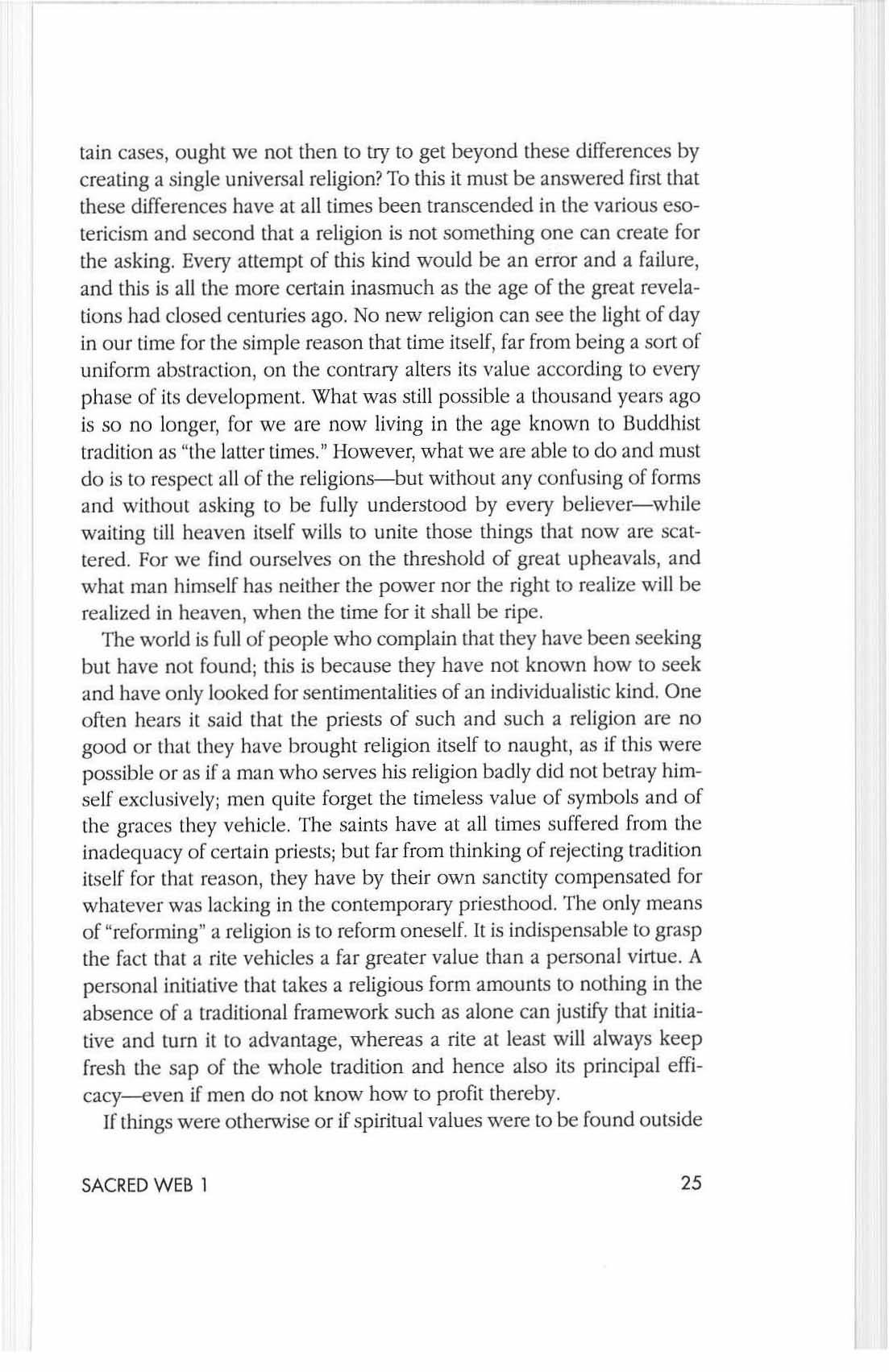
The world is full of people who comp lain that they have been seeking but have not found; this is because they have not known how to seek and have only looked for sentimentalities of an individualistic kind. One often hears it said that the priests of such and such a religion are no good or that they have brought relig ion itself to naught, as jf this were possible or as if a man who selVes his relig ion badly did not be tray himself exclusively; men qu it e forgel the timeless va lue of symbols and of the graces they veh icle. The saints have a t all times suffered from the inadequacy of certa in priests; but far from think ing of rejecting tr adition itself for that reason, they have by thei r own sanctity compensated for whatever was lacking in the contemporary priesthood. The only means of "reforming" a religion is to reform oneself. It is indispensable to grasp the fact that a rite vehicles a far greater value than a personal virtue. A persona l initiative that takes a religious form amounts to nothing in the absence of a traditiona l framework such as alone can justify that ini tiative and turn it to advantage , whereas a rite at least will always keep fresh Ole sap of the whole tradition and hence also its principal efficacy-even if men do not know how to profit thereby.
If things were otherwise or if spiritual values were to be found ou tside the sac red trad iti o ns, the function of th e sai n ts would ha ve been, not to en li ve n their religion , but rather to abolish it , and there would no longer be any reli gio n left on ea rth , o r e lse on the con trary there would be re li gions b y the million , which amo unts to th e same thing s; and th ese milli ons of p e rso nal p se udorelig ions would th emse lves be ch a ng ing at every minute. The re ligi o ns an d th eir orthodox deve lop m en ts-suc h as the various traditiona l sc hoo ls of Buddhism-are inalienab le an d irreplaceable legacies to which nothing essent ial ca n be added and from whi c h noth i ng essen ti al can be subtra ct ed. We a re here, not in ord er to ch a nge th ese things, but in o rd er to understan d th em and reali ze th e m in o ursel ves.
Today two da ngers are threatening religion: from the outside, its destruc ti o n-were it o nl y as a result of its genera l desertion-an d from the in sid e, its fal sificat ion. The latte r, wit h its pseudointellectual pretensions and its fallacious professions of "refo rm ," is immeas urably more harmfu l than all th e "s uperstit io n" and "co rrupti on" of whic h , rightly or wrongly , th e re prese nta ti ves o f the tr aditional patrimonies have been accused ; thi s herit age is absolutely irrepl aceab le, and in th e face o f it men as such are of n o account. T radition is abando ned, no t because peop le are n o longer ca pabl e o f understanding its language, but because they do not wish to unders tand it, for thi s la nguage is made to be understood till th e end of the world; tra diti on is falsified b y reducing it to flatness on the plea of making it more acceptable to "our time," as if one co uld-or s h ou ld-a ccommodate truth to error. Admittedly, a need to rep ly to new qu es tions and new forms of ign ora nce can always arise. One ca n a nd must exp l ain the sac re d doctrine , but not at th e expense of that w hich gives it its reason for existing , th at is to say, not at the expense of its truth a nd e ffectiveness. There could be no question , for i nstance, of adding to th e Mahayana or of replacing it b e a new vehicle, su c h as would n ecess arily be o f pure ly human invention ; for the Mahayana-or s ha ll we say Buddhi sm'-is infinite ly su ffi cie nt for th ose who will give th emse lves the trouble to loo k high er th an their ow n heads.
One point that has been already mentioned is worth recalling no w beca use of its ext reme imp ortance. It is quite ou t of the question that a "r eve lation, " in th e full sense of th e word 1 should arise in our tim e, o ne comparab le , th at is to say , to the imparting of one o f the great sutra s or any o th er primary scripture; the d ay of revelations is past on thi s globe and was so already long ago. The inspirations of th e sa int s are of another order, but these cou ld in any case never falsify or invalidate tradition or intrinsic orthodoxy by claiming to improve on it or even rep lace it, as some people ha ve sugg es ted. "Our own time " possesses no quality that makes it the measure or the criterion of values in regard to that which is timeless. It is th e timeless that, by it very nature, is the measure of our time, as indeed of all other times; and if our time has no place for authentic tradition, then it is se lf-condemne d by that very facl. The Buddha's message, like every other form of the one and only truth , offers itse lf to every period with an imperishable freshness. It is as true and as urgent in our day as it was two thousand years ago; the fa ct that mank ind finds itself in the "latter days," the days of forgetfulness and decline, only mak es that urgency more actua l than ever. In fact, th ere is nothing more urgent, more actual, or more real than metaphysica l truth and its demands. It alo ne can of it5 own right fill the vacuum left in the co ntemporary mentality-especially where young people are co nce rn ed-by soc ial and political disappointments on th e one hand and by the bewildering and indigestibl e discoveries of modern science on the other. At th e risk of re pe tition let the following point be s tressed, for to doubt it would be fata l: To search for an "ideology" in the h o pes of filling up that vacuum-as if it were simply a maller of plugging a hole-is truly a case of "pulling the cart before the horse ." It is a case of subordinating truth and sa lvation to narrowly utilitarian and in any case quite externa l ends, as if th e sufficient cause of truth cou ld be found somewhere below truth. The suffic ien t cause of man is to know the truth, which exist5 outside and above him; the truth cannot depend for its meaning and ex istence on the w ishes of man. The very wo rd "ide ology" shows that truth is not the principal aim people have in mind; to use that word shows that one is scarcely concerned with the difference between true and false and that what one is primarily seek ing is a mental deception that will be comforta ble and workable , or utilizab le for purposes of one 's own choosing, whic h is tantamount to abolishing both truth and intelligen ce.
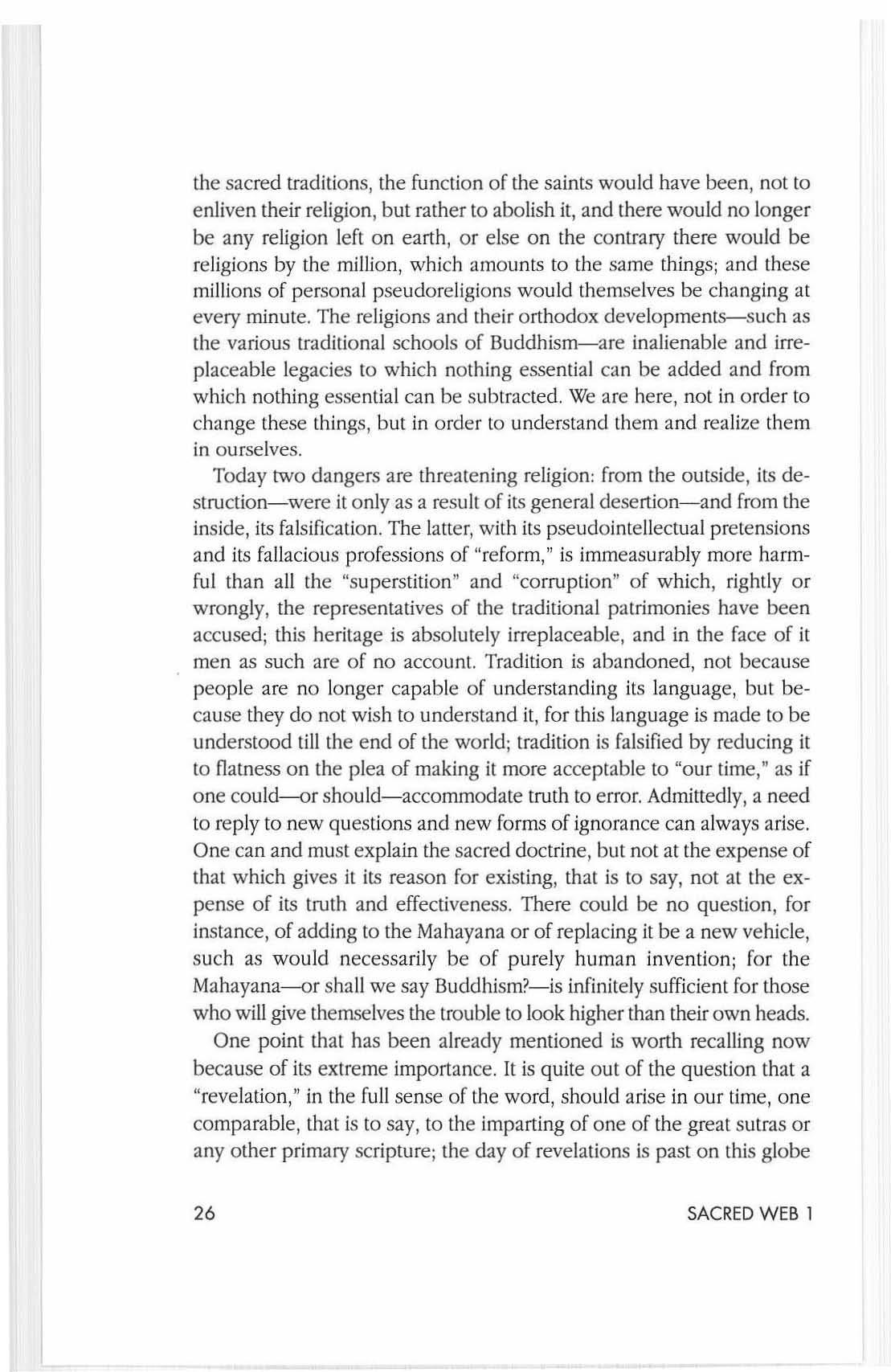
Outside tradition th ere can assuredly be found some relative truths or views of partial realities, but outside tradition th ere does not ex ist a doctri ne that catalyses absolute trut h and transmits liberating notions concerning lota l reality. Modern science is not a wisdom but an accumula- tion of physical expe rim e n ts coup led w ith many unwarrantable conclusions; it can neither add nor subtrac t anything in respect of the total truth or of mythological or othe r symbolism or in respect of the principles and experiences of the s p ir iLU allife.
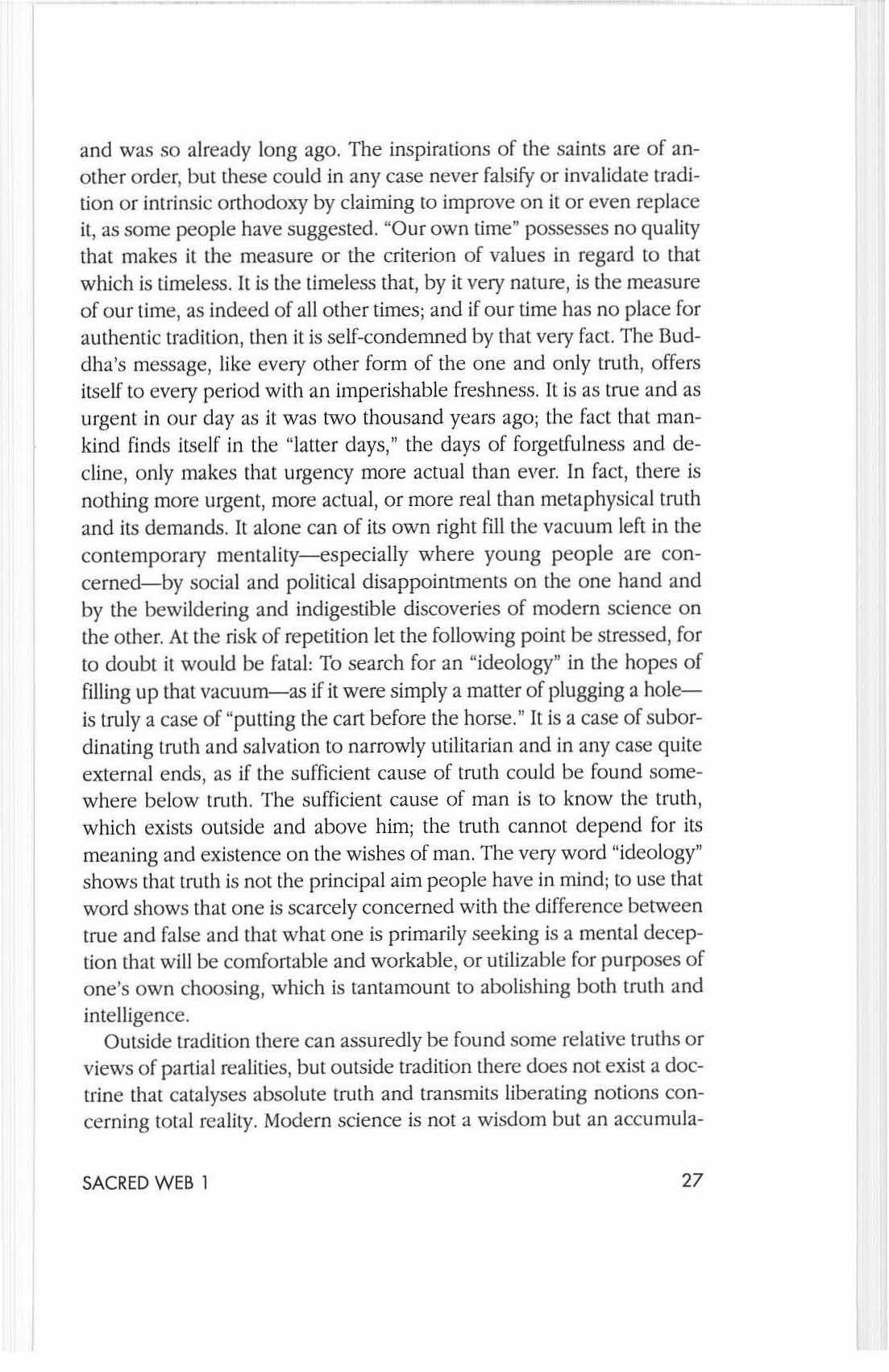
One of the most insidious and destruct ive illu sions is the belief that depth psychology (o r in other words psychoanalysis) has the slightest connection wi th spi ritual life, wh ich these teachings persistently fa lsify by confusing infe ri or elements with supe rior. We cannot be too wary of all these attempts to reduce the values vehided by tradition to the level o f phenomena su pposed to be sCientifi ca lly controll able. The spirit escapes the hold of profane science in an absol ute fashion. It is not the positive results of experimental science that one is out to deny (a lways assuming that th ey really are positive in definite sense) by the absurd daim of science to cover everything possib le, the whole of truth, th e whole of the real; this quasi-relig ious claim to totality moreover proves the falseness of the point of departure. If one takes into account the very limited realm within which science moves , the least one can say is that nothing justifies the so-ca lled scientific denials of the beyond and of the Absolute.
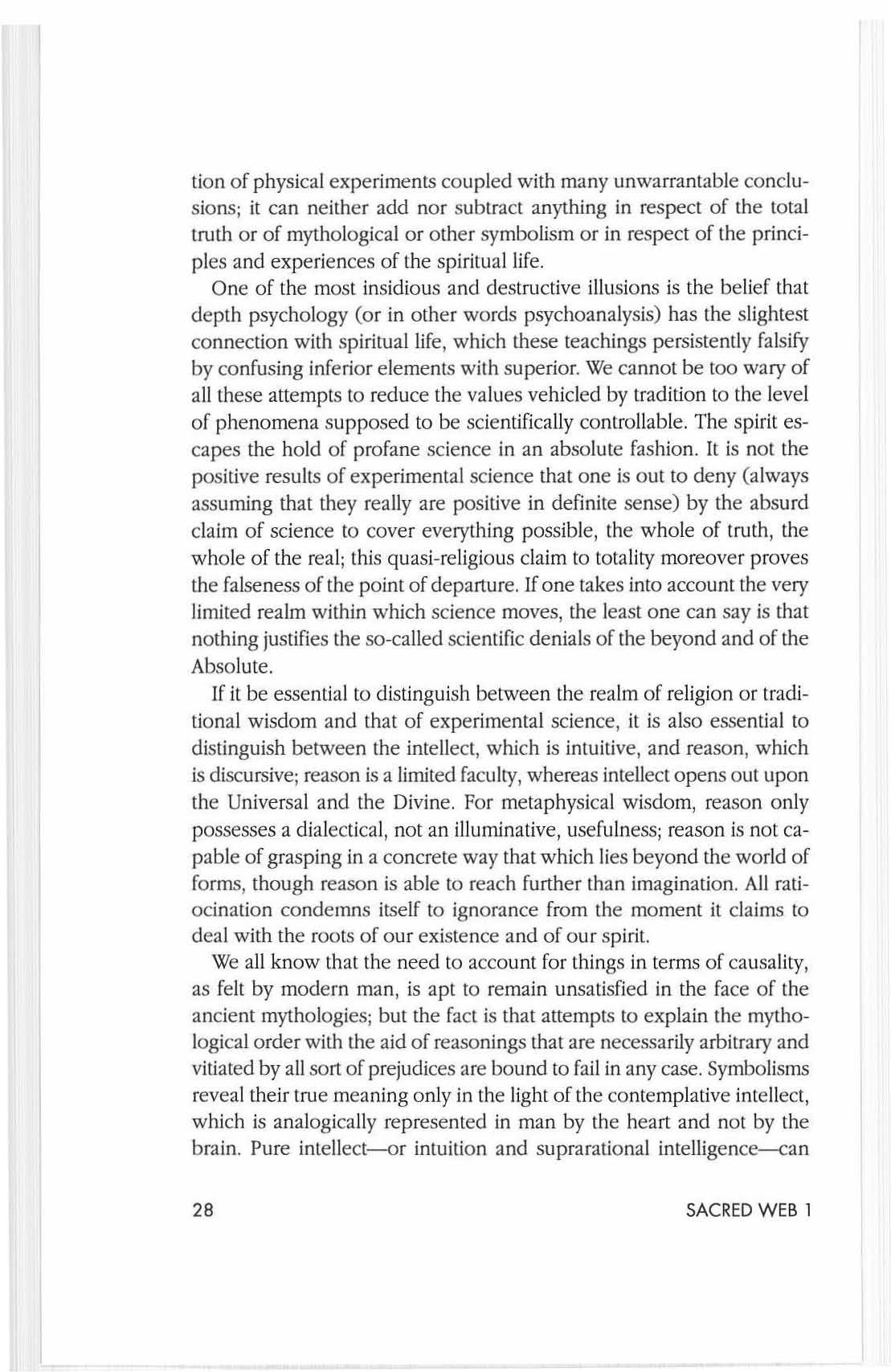
If it be essentia l to distinguish between th e realm of religion or traditional wisdom and that of experimen tal science, it is also essentia l to di st inguish betw ee n the intellect, wh ich is intuitive, and reason , which is discursive ; reason is a limited faculty, w hereas intellect opens out upon th e Universal and the Divine. For metaphysical wisdom, reason only possesses a d iale ctical, not an illuminative, usefulness; reason is not capable of grasping in a concrete way that which lies beyond the wo rld of forms , though reason is able to reach further th an imagination . A ll ratiocination condemns itself to ignorance from th e moment it claims to d ea l with the roots o f our existence and of our sp irit.
We all know that the need to accou nt for things in terms of ca u sality, as felt by modern man, is apt to remain unsatisfied in the face of the ancient mythol og ies; but the fa ct is that attempts to explain the m y thologica l order w ith the aid of rea son ings that are necess arily arb itrary and vitiated by all sort of prejudices are bound to fail in any case. Symbol isms reveal their tru e meaning only in the light of the contem plative inte lle ct , which is analogi ca lly represented in man by th e heart and not by the brain . Pure inlellecl-or intuition and suprarat iona l intelligence--ca flo we r o nl y in t he framework of a traditiona l orthodoxy, by reason of the co mpl e men tary and th e refore necessary re la tion sh ip between intellectio n and re ve lati on.
The fundam en ta l int e ntion of every religion or wisdom is the fo ll owing: first , d isce rnm ent betwee n the real an th e unreal , an d th e n conce ntration up o n th e rea l. One could also render this inte nti o n otherwise: truth and th e way, prajna an d upaya , do c trin e and its corres p ond ing me th od. One must kn ow that the Absolut e or th e Infinite-wh at ever may b e th e na mes given it by respec tiv e tradition s-is what gives se nse to our existence, just as onc must know that the essen ti al co nt e nt of life is the co nsc iOll sness of th is supreme reality , a fa ct that expla in s th e parl LO be played by co ntinual prayer; in a word we live to rea liz e th e Absolute. To rea li ze th e Absolute is to think of it , und e r one fo rm o r anot he r as indicated by revelation and tradition , by a fo rm s uch as th e Japanese nembutsu o r th e Tibetan Om man; padm e hum or the Hin du japa-yoga, n o t forgetting th e Christian a nd Islami c invocatio ns , s uc h as the J esus Praye r a nd the dhikr of the derv is he s. Here one will find some very diffe ren t mod a lities, not only as betwee n on e religio n a nd another bu t also w ithin th e fold of eac h re ligion , as can be s hown , for instance , by th e differe n ce b e twee n Jo d o Shins hu and Ze n . Howeve r thi s m ay be, it is on ly on th e basis of a ge nuin e spiritual life that we can e n visage any kind of exte rn a l action with a view to defendin g truth and sp iritu a lity in the world.
All th e traditi o nal e10c trine s agree in this: From a s tri c tl y s piritu a l po int of vi ew, th o ugh not nec essa rily from other much more re lative a nd th e refore less important points of view , mank ind is becoming more and more co rrupt ed; th e id eas o f "evo lution ," o r "progress, " and o f a s ingl e "civ iliza ti o n " are in effec t the most pern icious pseudodogmas th e world has ever produ ced, for there is no newfound e rror that does n o t eage rl y attach its ow n cl a ims to the abo ve beli efs. We say not that evolution is no ne xi s te nt , but that it ha s a partial and mo s t ofte n a q uit e ex ternal app licability; if th ere be evo lutio n on the o n e h a nd , th ere are dege neration s on th e ot he r, a nd it is in any c ase rad ica ll y false to s upp ose th a t ou r ancesto rs were intellectually , s pirituall y, o r mo ra Uy our infe rio rs. To su ppose thi s is the mos t c hildish of "optica l delusions "; hum an wea kn ess ahers it s style in the co ur se of history , but not its nature. A question th at n OW arises is as follows: See ing that humanity is decaying in escapa bl y SACRED WEB I and seei ng that th e final crisis with its cosmic consumma tion as fo retol d in t he sacred b oo ks is ine vitab le, what then can we do? Does an exte rnal activity still have a ny meaning?
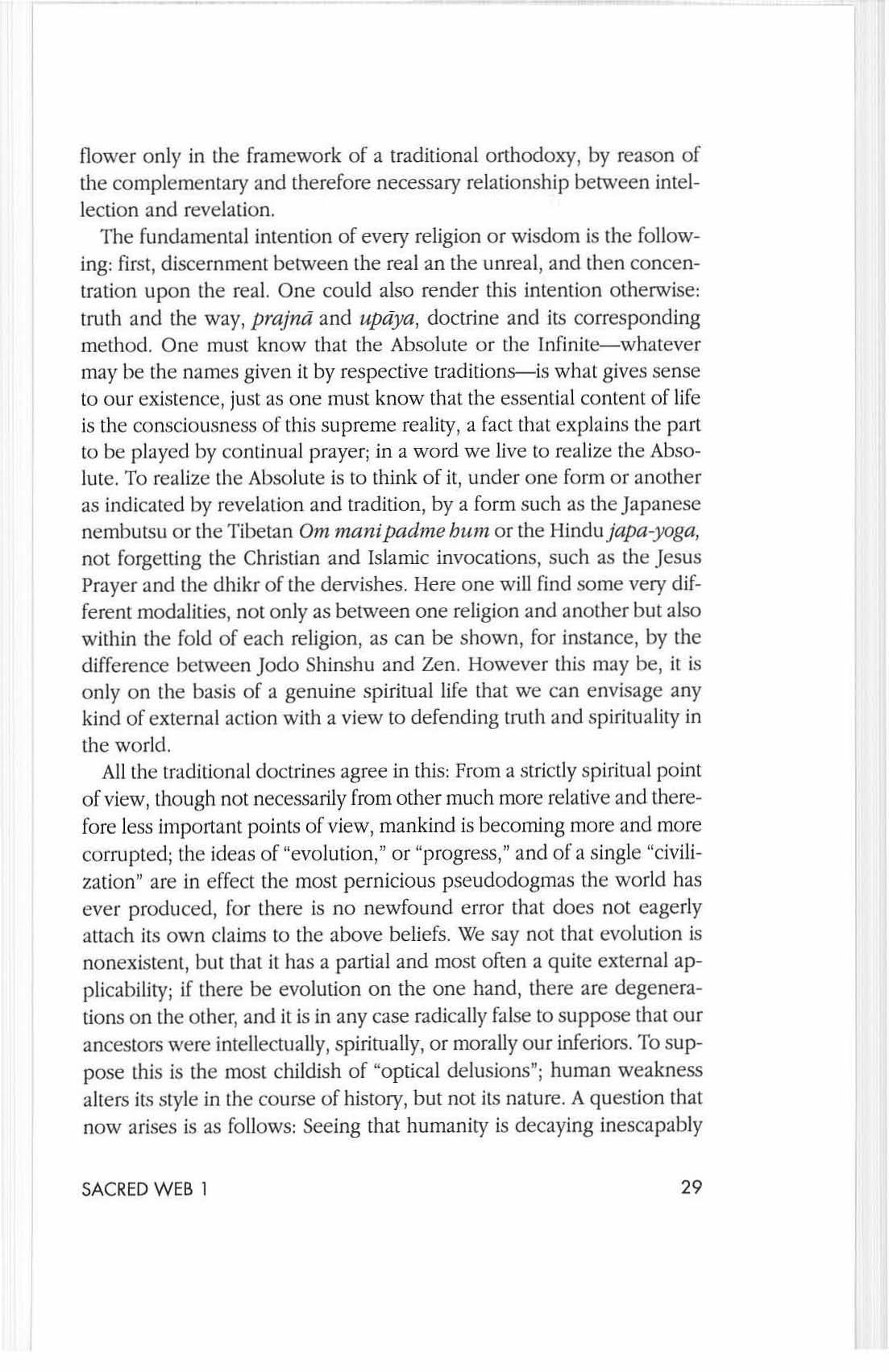
To this it mu s t be a nswe red that an affirmation o f the truth , or any effort o n behalf oftm th , is never in va in, even if we cannot from beforehand meas ure the value of the outcome of suc h an activity. Moreove r we have no c ho ice in the ma tte r. Once we know the tmth , we must li ve in it and fight for it; but what we mu st avoid at any price is t o let ou rse lves bask in illu sio ns. Even if, at thi s moment , the horizon see ms as d ark as pos sibl e, o ne must not forge t that in a p e rhaps unavoidabl y distant future the victory is ours and ca nnot but be ours. Tmth by its very n atu re conque rs all o b sta cle s: Vincit omnia ve ri/as
There fore , every initiative taken w ith a view to harm o n y be tw een th e differe nt cultures and for the defense of spir itua l values is good, if it has as its basis a recog nition of th e great principa l of truths and consequently also a recognition of tradition or of the traditions.
"Wben tbe inferior man bealS talk about Tao, be only laugbs a t iI; it would not be Tao if be did notlaugb as iI tbe self-evidence of Tao is taken for a darkness. " These words o f Lao-tse were never more t imely than now. Errors can not but be , as long as their qu ite relati ve possibility h as not reach ed its ter m; but for the Absolute errors ha ve nev e r been and neve r sha ll be. On their own p la ne they are wha t they are , but it is the Chang e less that sha ll ha ve t he final say.
